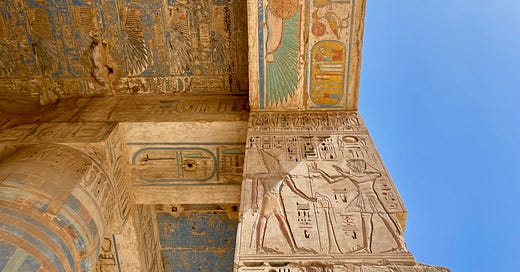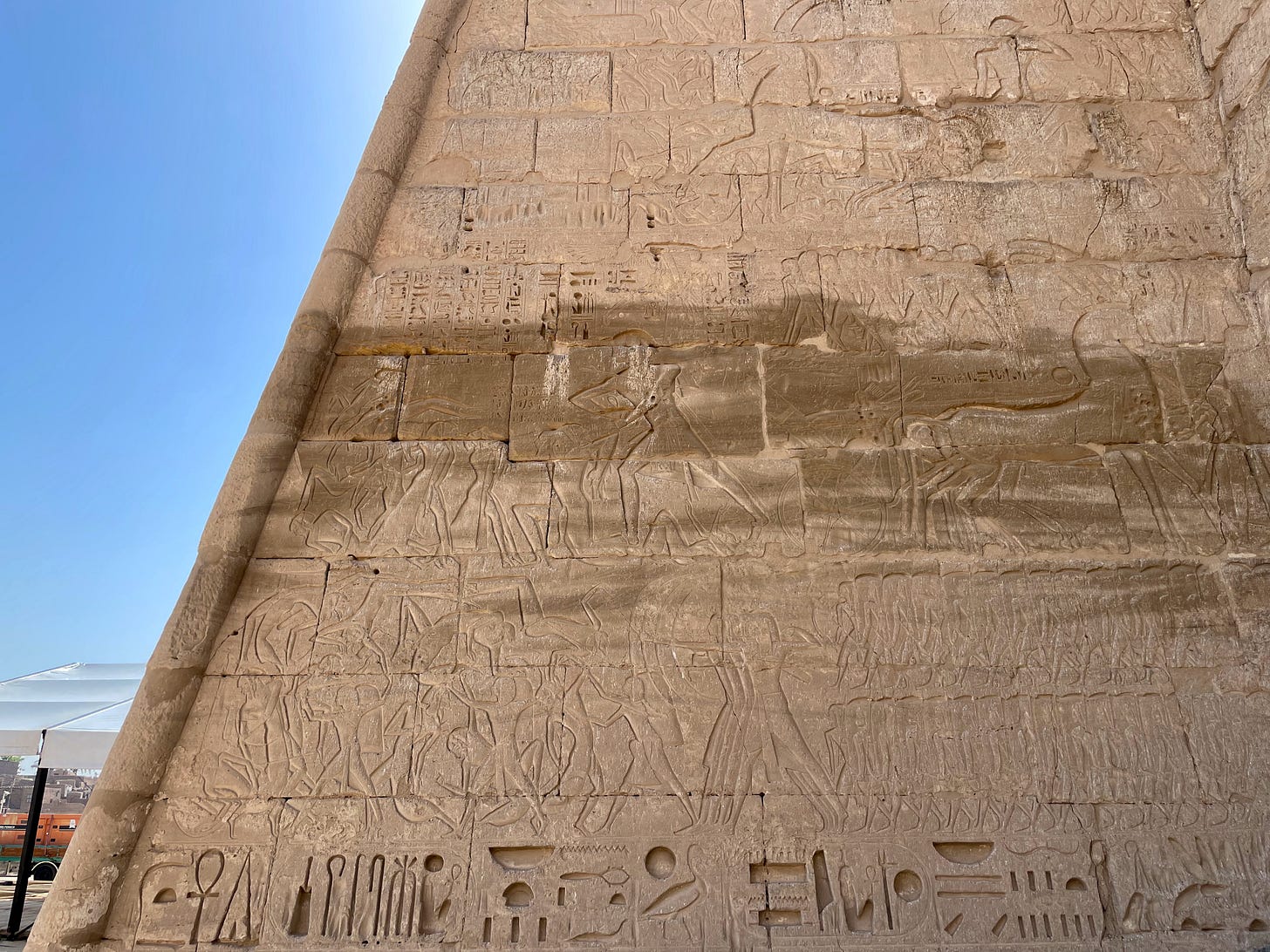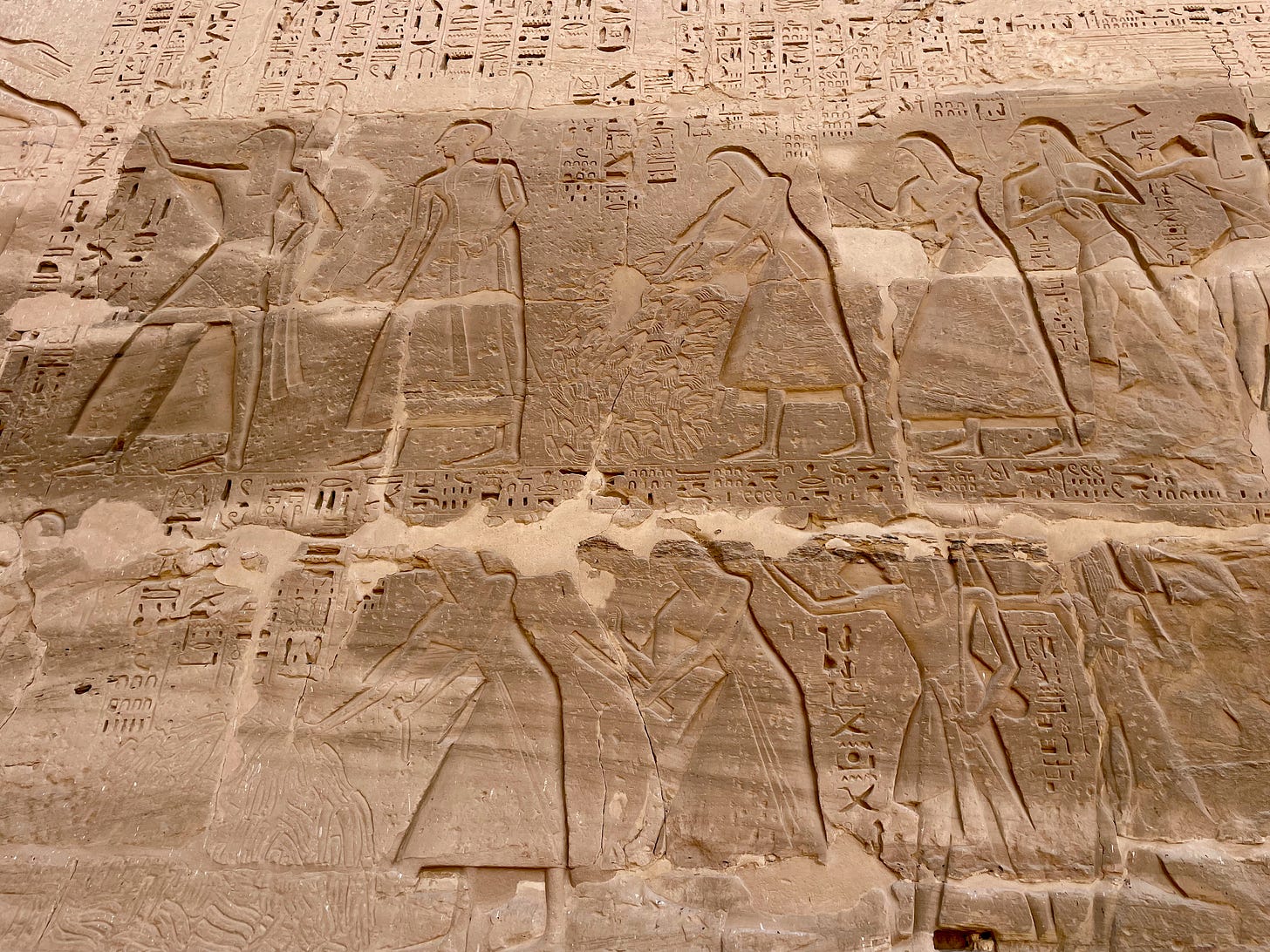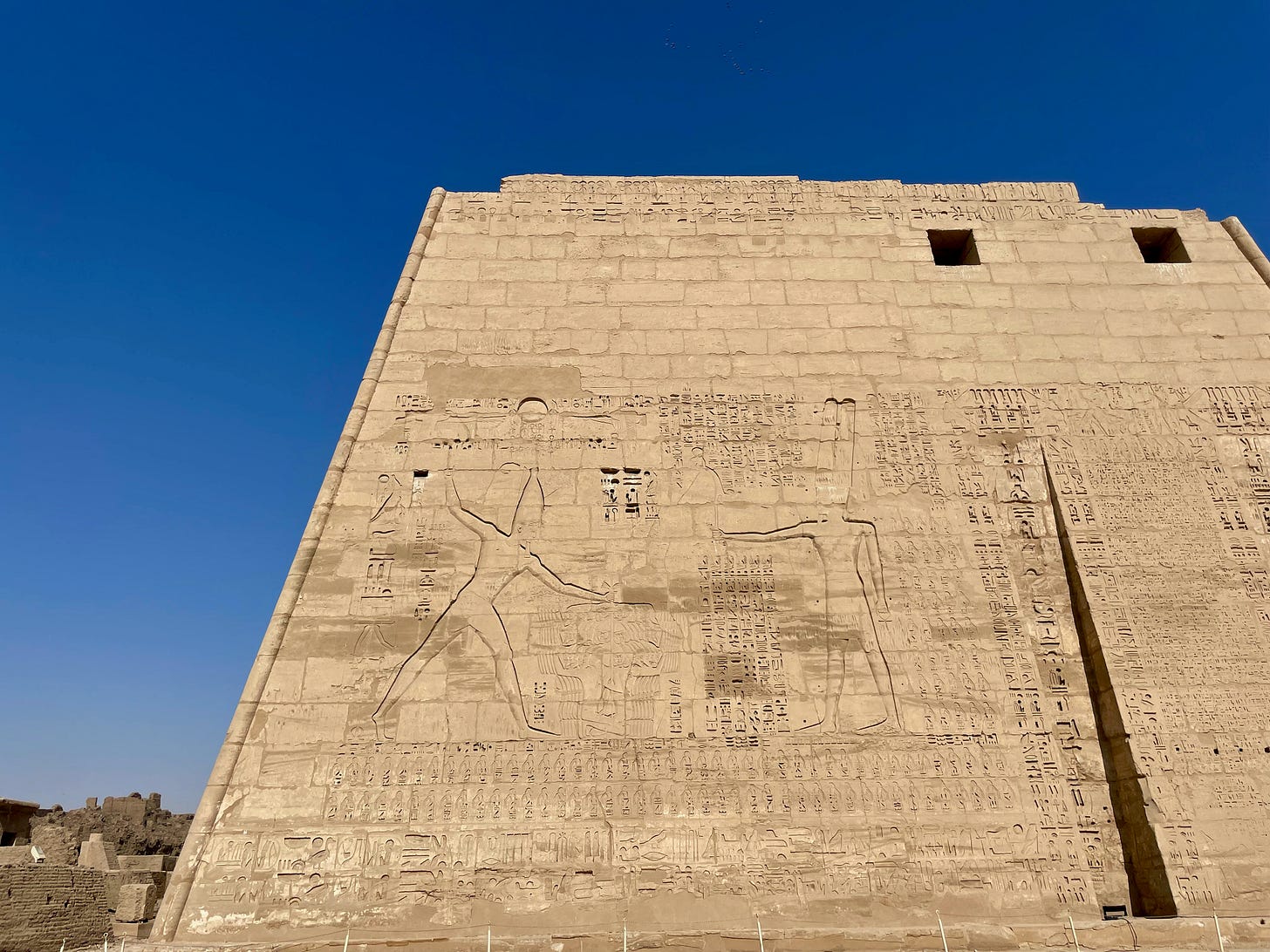When History's Narrators Are Unreliable: Luxor Part I
+ reflections on this newsletter and fun links to make you think
Friends, I did not want to write this newsletter today. I was surprised by my own reluctance, because I am just back from Luxor—home of ancient Thebes and the Valley of the Kings—and it was an inspiring trip. I have several reflective essays cooking about those experiences, which I’ll be serving up in the coming weeks. (Click below to share this newsletter with anyone interested in ancient Egypt so they can follow along!) But as I pass my three month anniversary on Substack and the initial energy spurt wears off, I’m starting to question what this publication’s organizing principle is and why the heck anyone would even want to read it.
On its surface, this is a newsletter about travel and life in Egypt. I’ve also said one of my goals is to inject some joy and authenticity into the cesspool the internet has become. Both statements are true, but neither gets at the deeper questions I want to explore.
What really interests me is how outward journeys affect the trajectory of our inner lives. What does travel force us to discover about ourselves? How does it change our understanding of history? Of how the world works? Of our individual roles in it? I consider myself a travel writer, but this newsletter isn’t about sharing travel tips (though I might once in awhile when I have a really great one!)—I plan to focus on the deeper stories places tell, and how we carry those stories forward with us.
That’s a big, broad task, I know. It means you will probably never know exactly what I’m going to put in your inbox. And yet, that’s the very essence of travel: you don’t know what you’ll discover next, but you know it’s going to be fun. Or character building, at least!
Finally, I am trying out a new feature this week called “elsewhere”—a roundup of great writing about travel, food, and other fun stuff. You can find it at the bottom of today’s newsletter. If you all find it interesting, I’ll continue to add it to shorter posts.
Now on to Luxor and ancient Egypt’s New Kingdom…
Immediately outside Luxor’s small downtown are green fields of sugar cane, banana trees, and hibiscus plants. The air is clean here, and the wide Nile bleeds into lush flood plains. The modern city is situated on the river’s east bank, but the majority of ancient sites are on the west bank, where the sun sets and—according to the religion of the pharaohs—moves into the undying lands of the underworld.
The mortuary temple of Ramesses III1 is one of the west bank’s less frequented sites. Its interior is plastered with typical pharaonic religious art in energetic greens, blues, reds, and yellows. But it has a more unique allure—Ramesses III was an undefeated warrior king, and his temple tells of his exploits in chaotic, action-filled reliefs.
His archers and chariots crush enemies on the battlefield and take them prisoner. He inspects piles of the severed hands, tongues, and penises of those who challenged Egypt. He grabs invading Libyan and Syrian chieftains by the hair, preparing to execute them with a sword handed to him by the gods themselves. In words carved into the walls, Ramesses III says:
[Amon’s]2 great and powerful sword is mine, as a reinforcement, to make every land prostrate under my soles. He has assigned to me victory; his hand is with me, so that everyone who violates my frontier is slain in my grasp. … I am established upon his throne in peace.
As I squinted against a merciless morning sun and tried to make out the details of these conquests, the sandstone itself seemed to whisper an axiom: history is written by the victors. And victors tend to be unreliable narrators, more concerned with glory than truth.
The temple would have you believe Ramesses III was a savior of Egypt, a bringer of lasting stability. The stories the reliefs tell are all technically true. However, the historical context—which was not so different from our own—paints another picture. Ramesses III reigned in the mid-12th century BC, a period we now know as the Bronze Age collapse, which was characterized by a confluence of disasters that brought down most civilizations of the Mediterranean. There was plague, drought, climate change, political unrest. (Any of that sound familiar?)
The era was so turbulent that it isn’t certain which disasters caused which effects. What is clear is that due to the turmoil, Ramesses III’s reign was not the one of lasting stability he would have us believe. Recorded history’s first labor strike occurred under Ramesses III when he could not provide his artisans and craftsmen with their rations after a volcanic winter caused a food shortage. (This episode is not recorded in the temple.)
The Bronze Age collapse also brought mass migration to the Mediterranean as populated lands became unlivable. Egypt was invaded repeatedly, including by the Sea Peoples, a Viking-like coalition of unknown origin. One of the temple’s most famous reliefs is a retelling of the battle in which Ramesses III crushed the Sea Peoples at the mouth of the Nile; what at first glance looks like a series of random strokes and scratches is actually a jumble of twisted, broken bodies dragged from a warship.
As the Sea Peoples left no written record, all we have is Ramesses III’s story in which he honorably crushes the marauders. Yet it is difficult to look at the brutality of the scene and not sympathize with the Sea Peoples, whom most experts believe were refugees driven from their homelands by climate change. Ramesses III saw himself as a righteous warrior and memorialized himself accordingly, but as I scrutinize the photos I took of his temple, I see something entirely different. I see a man desperately clinging to the appearance of strength and steadfastness as he beats back hordes in search of food and water, while the world around him falls to ruin.
I doubt Ramesses III imagined that the relief might have this effect 3000 years after his death. He likely never imagined that such chaos would circle back at all. But experts estimate climate change will displace more than 1 billion people by 20503, and it remains to be seen whether they will be welcome when they migrate. If not—what victors will tell that story, and what will they say?
elsewhere
Very on theme: Mike Sowden of Everything is Amazing just did a deep dive on how the ancient world was much more colorful than we think. Read it here.
Sleep tourism is on the rise. Would you travel to improve your sleep habits?
Egyptian archaeologists are petitioning the British Museum to return the Rosetta Stone.
Have you ever tried a screen detox? My former classmate Stephanie talks about what she learned from a screen-free September.
And just for fun: Nick’s birthday is coming up, so I’m making this classic chocolate babka. (It’s easier than it looks!)
That’s all for today—see you next week. :)
A fun fact to give you a sense of the scale of ancient Egypt’s history: Ramesses III reigned nearly 1500 years after the great pyramid was built.
Ancient Egypt’s chief deity, the god of the sun and creation.
https://www.theguardian.com/environment/2020/sep/09/climate-crisis-could-displace-12bn-people-by-2050-report-warns












I loved this phrase, "you will probably never know exactly what I’m going to put in your inbox", and I hope it will be the case, a wonderful promise. I loved imagining the east bank as the side where the sun rose each morning on the modern world, and the west bank as a land of the past. To go back in time, simply head west, and see how a king wanted to be remembered. The zooming out to consider the historical context (my favorite thing) on a how a king wanted to be seen, as the sun set on the Bronze age, took on new meaning with a comparison to the present. Another great story, plus links!
I once stayed at the Luxor hotel in Las Vegas and I'm pretty sure I had the exact opposite experience as this, haha! Beautiful pictures and history lesson. When I visit places like this, I always wonder how much we understand, knowing unreliable narrators of the stories that get passed down. Places as old as this, it's basically the longest game of telephone. I also found interesting the mirroring of all the events then, and how it sounds eerily familiar to now.
Also, agree with one of your other commenters, write whatever you want!
Thank you for the shout out :)